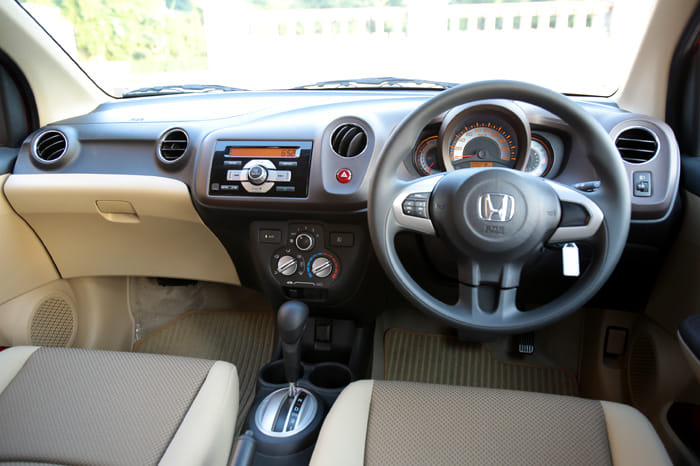Honda has greatly enhanced the user-friendly character of its Brio hatchback with the launch of an automatic version that goes on sale on October 18. Instead of the CVT gearbox used in the Brio in Thailand and other markets, Honda has opted to equip the Indian Brio with a conventional five-speed auto, driven by a torque converter. In fact, the gearbox is similar to the one in the City Automatic, but with different gear ratios.
The Brio Automatic joins the handful of budget automatics available in the Indian market, and with the lack of strong competition, Honda believes that the Brio Auto could account for 5-10 percent of its total sales. However, the demand for the car will hinge largely on its price and fuel efficiency.
Whilst prices are not announced yet, we expect the Brio Auto to be around Rs 60,000 more than the equivalent manual version. In terms of fuel efficiency, the Brio Auto returns 16.5kpl in the Indian Driving Cycle (IDC) – 2.9kpl less than its more efficient manual sibling. This should make the Brio Auto around 10-15 percent thirstier than the manual in the real world. So is the convenience of an automatic worth the extra you will have to pay each time you fill up?
Slip, or rather charge into Delhi traffic and the immediate answer is ‘Yes!’. The five-speed auto is eager enough to make light work of the cut and thrust of rush hour and, at part throttle, the Brio Auto feels pretty responsive. It’s only when you stab the throttle wide open for a quick overtaking manoeuvre that the gearbox feels a bit lazy, taking a bit of time to kick down to a lower gear. However, you can work around this by snicking the lever down to D2 or even D1; this holds onto each gear just like in a manual and does not upshift automatically, even at the redline.
On the open road, the Brio is surprisingly peppy and overtaking is pretty easy. This brings us to the 86.7bhp, 1.2-litre engine, which is the main reason for the Brio’s sprightly nature. This i-VTEC motor is an absolute jewel that thrives in the upper reaches of the rev band.
The Brio was always a brilliant city car thanks to its perky responses, agile handling and compact dimensions. Now with the automatic version, it’s quite an ideal one.




